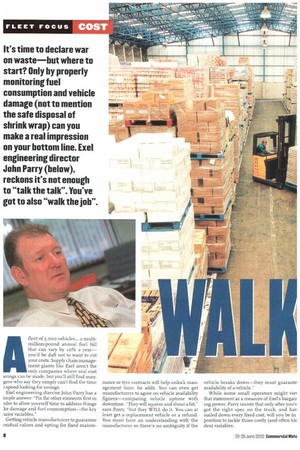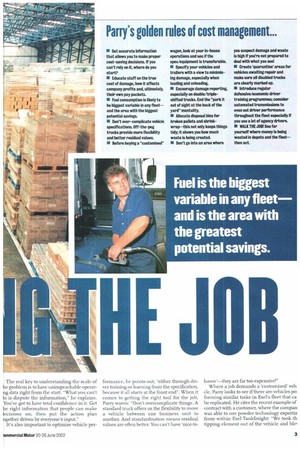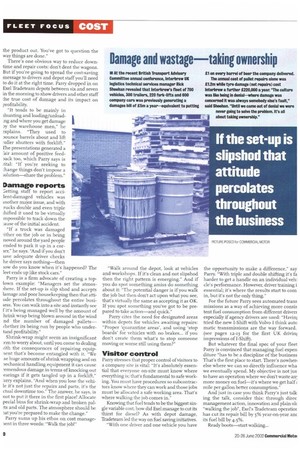It's time to declare war on waste—but where to start?
Page 38

Page 39

Page 40

If you've noticed an error in this article please click here to report it so we can fix it.
Only by properly monitoring fuel consumption and vehicle damage (not to mention the safe disposal of shrink wrap) can you make a real impression on your bottom line. Exel engineering director John Parry (below), reckons it's not enough to "talk the talk". You've got to also "walk the job".
Afleet of 5,000 vehicles.., a multimillion-pound annual fuel bill that can vary by 10% a year— you'd be daft not to want to cut your costs. Supply chain management giants like Exel aren't the only companies where real cost avings can be made, but you'll still find mangers who say they simply can't find the time 3 spend looking for savings.
Exel engineering director John Parry has a imple answer: "Fix the other elements first in rder to allow yourself time to address things .ke damage and fuel consumption—the key aajor variables."
Getting vehicle manufacturers to guarantee esidual values and opting for fixed mainte
nance or tyre contracts will help unlock management time, he adds. You can even get manufacturers to agree on vehicle availability figures—comparing vehicle uptime with downtime. "They will squirm and shout a bit," says Parry, but they WILL do it. You can at least get a replacement vehicle or a refund. You must have an understanding with the manufacturer so there's no ambiguity if the vehicle breaks down—they must guarante availability of a vehicle."
While some small operators might vie) that statement as a measure of Exel's bargair ing power, Parry insists that only after you'v got the right spec on the truck, and hay nailed down every fixed cost, will you be in position to tackle those costly (and often hic den) variables. The real key to understanding the scale of he problem is to have unimpeachable operatng data right from the start. "What you can't to is dispute the information," he explains. You've got to have total confidence in it. Get he right information that people can make tecisions on; then put the action plan ogether driven by everyone's input."
It's also important to optimise vehicle per
formance, he points out, "either through driver training or learning from the specification, because it all starts at the front end". When it comes to getting the right tool for the job, Parry warns: "Don't overcomplicate things, A standard truck offers us the flexibility to move a vehicle between one business unit to another. And standardisation means residual values are often better. You can't have 'nice-to haves'—they are far too expensive!"
Where a job demands a 'customised' veh cle, Parry looks to see if there are vehicles pe, forming similar tasks in Exel's fleet that ca be replicated. He cites the recent example of contract with a customer, where the compan was able to use powder technology expertis from within Exel Tankfreight: "We took th tipping element out of the vehicle and ble,
the product out. You've got to question the way things are done."
There's one obvious way to reduce downtime and repair costs: don't dent the wagons. But if you're going to spread the cost-saving message to drivers and depot staff you'll need to do it at the right time. Parry dropped in on Exel Tradeteam depots between six and seven in the morning to show drivers and other staff the true cost of damage and its impact on profitability. "It tends to be mainly in ;hunting and loading/unloadrig and where you get damage )y the warehouse men," he mplains. "They used to 3ounce barrels about and lift :oiler shutters with forklift." [he presentations generated a :air amount of positive feed)ack too, which Parry says is rital: "If you're seeking to :hange things don't impose a ;olution—share the problem."
Damage reports
:ening staff to report acciient-damaged vehicles was mother major issue, and with nicks double and even triple ihifted it used to be virtually mpossible to track down the Ause of the initial accident.
"If a truck was damaged iither on the job or in being noved around the yard people ended to park it up in a carter," he says. "And if you don't lave adequate driver checks he driver says nothing—then low do you know when it's happened? The leet ends up like stock cars."
Parry is a firm advocate of creating a toplown example: "Managers set the atmosthere. If the set-up is slip shod and accepts lamage and poor housekeeping then that attiude percolates throughout the entire busiLess. You can walk into a site and instantly see Fit's being managed well by the amount of hrink wrap being blown around in the wind nd the number of damaged palletselether its being run by people who undertand profitability." Shrink-wrap might seem an insignificant Rtil to worry about, until you come to dealing tith the consequences of repairing equipaent that's become entangled with it. "We se huge amounts of shrink wrapping and on aedianical handling equipment it can cause -emendous damage in terms of knocking out earings if it gets tangled up in a forklift," 'army explains. "And when you lose the vehile it's not just the repairs and parts, it's the ctual downtime too." The answer, he says, is not to put it there in the first place! Allocate pecial bins for shrink-wrap and broken pal!ts and old parts. The atmosphere should be :tat you're prepared to make the change."
Parry sums up his ethos on cost managelent in three words: "Walk the job!" "Walk around the depot, look at vehicles and workshops. If it's clean and not slipshod then the right pattern is emerging." And if you do spot something amiss do something about it: "The potential danger is if you walk the job but then don't act upon what you see, that's virtually the same as accepting it as OK. If you spot something you've got to be prepared to take action—and quick."
Parry cites the need for designated areas within depots for vehicles awaiting repairs: "Proper `quarantine areas', and using `stop boards' for vehicles with no brakes... if you don't create them what's to stop someone moving or worse still using them?"
Visitor control
Parry stresses that proper control of visitors to a company site is vital: "It's absolutely essential that everyone on-site must know where everything is; that's fundamental to safe working. You must have procedures so subcontractors know where they can work and those jobs must be allocated a safe working area. That's where walking the job comes in."
Knowing that fuel tends to be the biggest single variable cost, how did Exel manage to cut its thirst for diesel? As with depot damage, Tradeteam led the way on fuel saving initiatives. "With one driver and one vehicle you have the opportunity to make a difference," say Parry. "With triple and double shifting it's fa harder to get a handle on an individual veil cle' s performance. However, driver training i essential; it's where the results start to corn in, but it's not the only thing."
For the future Parry sees automated tram missions as a way of achieving more consis tent fuel consumption from different drivers especially if agency drivers are used: "Havini tried the new I-Shift with Volvo I think auto matic transmissions are the way forward. (see pages 12-13 for the first UK drivinj impressions of I-Shift).
But whatever the final spec of your fleet Parry is convinced that managing fuel expen diture "has to be a discipline of the business That's the first place to start. There's nowhere else where we can so directly influence wha we eventually spend. My objective is not jus to have an operation where we don't waste an more money on fuel—it's where we get half i mile per gallon better consumption." And just in case you think Parry's just talk Mg the talk, consider this: through direc management action, innovation and plain ok "walking the job", Exel's Tradeteam operatior has cut its repair bill by 5% year-on-year am its fuel bill by 4.5%. Ready boots—start walking...
























































































































































